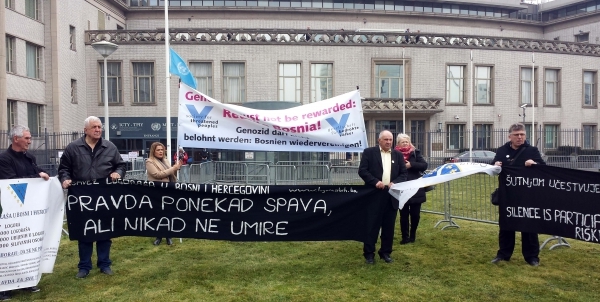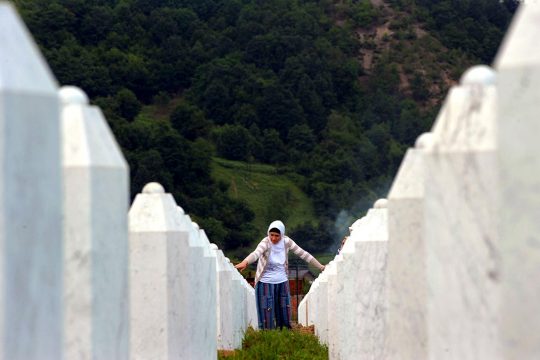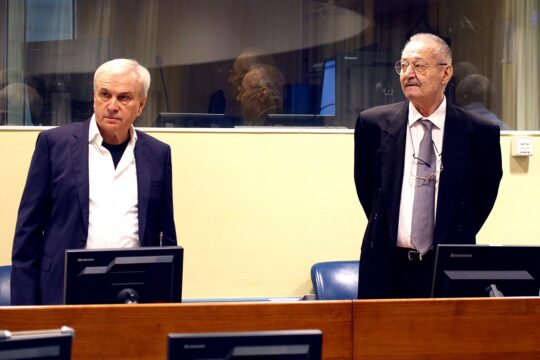Former Bosnian Serb political leader Radovan Karadzic has been found guilty of genocide, crimes against humanity and war crimes committed during the war in Bosnia-Herzegovina (1992-1995). He was sentenced to 40 years in jail, but his lawyer will appeal. This judgment handed down on March 24 is the most important in the history of the International Criminal Tribunal for the former Yugoslavia (ICTY).
Radovan Karadzic appeared tired and defeated as he listened to the judgment being read out. The former Bosnian Serb political leader was found ten times guilty. He was convicted for genocide in July 1995 in Srebrenica, where his forces killed more than 6,000 Muslim men and deported their children, wives and mothers to other territories. Karadzic was also found guilty of crimes against humanity committed during the 44-month siege of the much-coveted capital Sarajevo, pounded by Serb artillery and shot at by snipers. He was convicted of war crimes for the hostage taking of UN members in May 1995 to try and stop UN intervention. He was also found guilty of war crimes perpetrated in several municipalities of Bosnia-Herzegovina, but was acquitted of genocide for these same massacres. Victims from Bosnia demonstrating outside the Tribunal, including Srebrenica widows and former detainees at Omarska and Trnopolje camps, bitterly denounced the acquittal on this charge and the 40-year sentence which they say is too light.
An “ethnically pure State”
Why was Radovan Karadzic acquitted of genocide in these municipalities? In their decision, the judges concluded that “victims were killed in mass execution” or in detention. They say that in 26 cases of mass killings, the intent was extermination and add that “the campaign of forcible takeover of municipalities and the expulsion of non-Serbs were carefully coordinated, directed and ultimately intended by the Accused and the Bosnian Serb leadership”. But they considered that this was not genocide, which is defined essentially according to the killers’ intent. In their analysis, the judges relied on speeches made before and during the war. The three ICTY magistrates deemed that the objective of Bosnian Serb leaders was to create an “ethnically pure Bosnian Serb State”, but that they were aiming for “redistribution, rather than a physical destruction of the population”. The Bosnian Serbs “promoted the idea that they could not live with anyone else”, and wanted to see Bosnia-Herzegovina “divided along ethnic lines”. Whilst Karadzic declared that “coexistence with the non-Serbs (…) is impossible”, the Tribunal deemed this did not show “an intention to physically destroy part” of the Muslim and Croat groups of Bosnia. “Even if the Bosnian Serb leadership “questioned the identity of the Bosnian Muslims as a nation or a people”, the speeches were part of a political objective, to conquer a Serb territory “by force if necessary”. The Trial Chamber also examined references to “genocide” perpetrated against Serbs during the Second World War, which were used by Serb leaders in the 1990s. The Court recognized that such speeches spread fear and ensured leaders the support of their group, but said it did not demonstrate a desire to commit a counter-genocide. According to the judges, the terms “extermination” and “extinction” of Muslim and Croat populations used in inflammatory speeches were used as a threat against those who would go against Serb interests, notably the Bosnian Muslims’ desire for independence, which was finally recognized by Europe and the US on April 6, 1992.
A clement sentence
Even if the Tribunal has been stressing for years the individual nature of the verdicts it pronounces, it was as former President and supreme commander of Republika Srpska that Karadzic was convicted. He had a “leading role” in a vast criminal enterprise, in which Assembly President Momcilo Krajisnik, military boss Ratko Mladic, Bosnian Serb Iron Lady Biljana Plavsic, former Yugolsav President Slobodan Milosevic and Belgrade master-spy Jovica Stanisic also participated. They have also appeared before the Tribunal. A sentence of 40 years for the Srebrenica genocide and crimes against humanity in mass executions and the siege of Sarajevo seems too light for the victims. Radovan Karadzic could have got life, but the judges decided otherwise. His age (70) was one of the mitigating factors, but also the fact that he agreed to withdraw from politics on July 19, 1996. Whatever his reasons, the ICTY said the most important thing was that “his decision had an influence in establishing peace and stability in Bosnia-Herzegovina and the region following the Dayton accords”. But in The Hague, Srebrenica widow Kada Hotic called this “a sentence for a soldier, not for a commander”.
Each time the Tribunal pronounces a judgment, it is criticized, as ICTY President Serge Brammertz recognizes. “Each time a judgment is pronounced in The Hague, some people cry victory and others cry injustice,” he said. “For me, this shows that the problem at the heart of the conflict is still present. This nationalism is no longer expressed with weapons, but it is still latent.” The 110 convictions pronounced by the ICTY since 1996 against Serbs, Bosniaks, Croats and Kosovars have all provoked reactions of ethnic solidarity.
What impact?
Serbian Prime Minister Aleksandar Vucic, reacting to the verdict from Belgrade, issued a warning to “all those who might want to use this verdict as an excuse” to “attack” Republika Srpska, the Bosnain Serb entity. “In accordance with the Dayton accords [peace accords of December 1995 which granted Serbs the territories they had acquired by force], Serbia cannot and will not allow that to happen,” he said. Many have been seeing in this second conviction for genocide a political lever to question the structure of a country separated into two entities – the Bosnian Serb entity and the Muslim-Croat federation –which is almost ungovernable. Bakir Izetbegovic, a Muslim member of the Bosnia-Herzegovina collegial presidency, said that the ICTY had pronounced the “most important verdict since Nuremberg”, where the Allies tried Nazi leaders after the Second World War. So what impact may this verdict have today or in the future on Bosnia-Herzegovina? The day that everyone faces the truth and recognizes that there were killers in every camp, the day that people cry for all the victims, perhaps it will be time for them to read the ICTY’s 2,590-page judgment against Karadzic. It is a long litany of crimes committed by Bosnian Serbs in Bosnia-Herzegovina between 1992 and 1995. It is also the result of 10 years of ICTY investigations from 1995 to 2005 and more than 20 years of trials since this Tribunal was created by the UN Security Council in May 1993.






